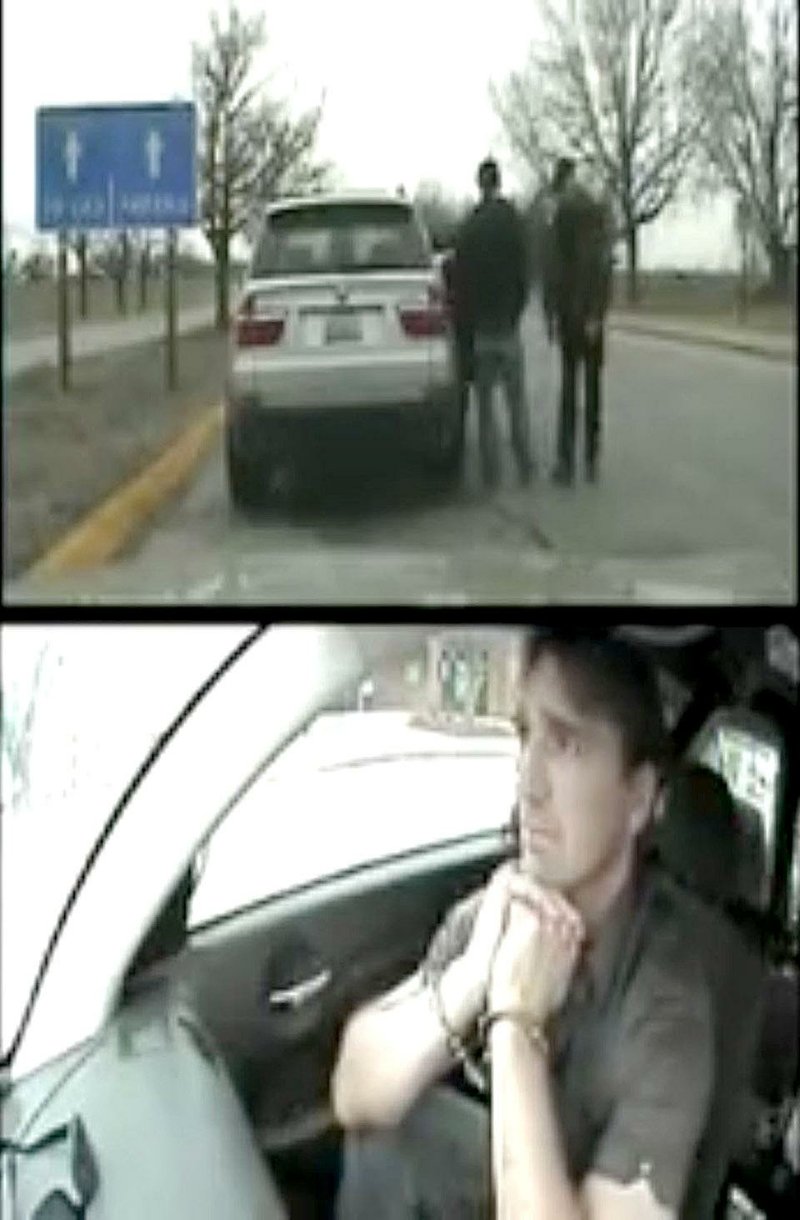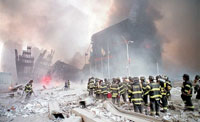WASHINGTON -- After the terrorist attacks on Sept. 11, 2001, the government called on police to become the eyes and ears of homeland security on America's highways.
Municipal officers, county deputies and state troopers were encouraged to act more aggressively in searching for suspicious people, drugs and other contraband. The departments of Homeland Security and Justice spent millions on police training.
The effort succeeded, but it had an effect that has been largely hidden from public view: the spread of an aggressive brand of policing that has spurred the seizure of hundreds of millions of dollars in cash from motorists and others not charged with crimes, a Washington Post investigation found. Thousands of people have been forced to fight legal battles that can last more than a year to get their money back.
Behind the rise in seizures is a little-known industry of private police-training firms that teach the techniques of "highway interdiction" to departments across the country.
One of those firms created a private intelligence network known as Black Asphalt Electronic Networking & Notification System that enabled police nationwide to share detailed reports about American motorists -- criminals and the innocent alike -- including their Social Security numbers, addresses and identifying tattoos, as well as hunches about which drivers to stop.
Many of the reports have been funneled to federal agencies and fusion centers as part of the government's burgeoning law enforcement intelligence systems -- despite warnings from state and federal authorities that the information could violate privacy and constitutional protections.
A thriving subculture of road officers on the network now competes to see who can seize the most cash and contraband, describing their exploits in the network's chat rooms and sharing "trophy shots" of money and drugs. Some police advocate highway interdiction as a way of raising revenue for cash-strapped municipalities.
"All of our home towns are sitting on a tax-liberating gold mine," Deputy Ron Hain of Kane County, Ill., wrote in a self-published book under a pseudonym. Hain is a marketing specialist for Desert Snow, a leading interdiction training firm based in Guthrie, Okla., whose founders also created Black Asphalt.
Hain's book calls for "turning our police forces into present-day Robin Hoods."
Cash seizures can be made under state or federal civil law. One of the primary ways police departments are able to seize money and share in the proceeds at the federal level is through a long-standing Justice Department civil-asset forfeiture program known as Equitable Sharing.
"Those laws were meant to take a guy out for selling $1 million in cocaine or who was trying to launder large amounts of money," said Mark Overton, the police chief in Bal Harbour, Fla., who once oversaw a federal drug task force in South Florida. "It was never meant for a street cop to take a few thousand dollars from a driver by the side of the road."
To examine the scope of asset forfeiture since the terrorist attacks, The Washington Post analyzed a database of hundreds of thousands of seizure records at the Justice Department, reviewed hundreds of federal court cases, obtained internal records from training firms and interviewed scores of police, prosecutors and motorists.
The Post found:
• There have been 61,998 cash seizures made on highways and elsewhere since 9/11 without search warrants or indictments through the Equitable Sharing Program, totaling more than $2.5 billion. State and local authorities kept more than $1.7 billion of that while Justice, Homeland Security and other federal agencies received $800 million. Half of the seizures were below $8,800.
• Only a sixth of the seizures were legally challenged, in part because of the costs of legal action against the government. But in 41 percent of cases -- 4,455 -- where there was a challenge, the government agreed to return money.
• Hundreds of state and local departments and drug task forces appear to rely on seized cash, despite a federal ban on the money to pay salaries or otherwise support budgets. Since 2008, 298 departments and 210 task forces have seized the equivalent of 20 percent or more of their annual budgets.
• Agencies with police known to be participating in the Black Asphalt intelligence network have seen a 32 percent jump in seizures beginning in 2005, three times the rate of other police departments.
• State law enforcement officials in Iowa and Kansas prohibited the use of the Black Asphalt network because of concerns that it might not be a legal law enforcement tool. Officials at Justice and Homeland Security continue to use it.
Justice spokesman Peter Carr said the department had no comment on the overall findings. But he said the department has a compliance review process in place for the Equitable Sharing Program and attorneys for federal agencies must review the seizures before they are "adopted" for inclusion in the program.
"Adoptions of state and local seizures -- when a state and local law enforcement agency requests a federal seizing agency to adopt a state and local seizure for federal forfeiture -- represent an average of only 3 percent of the total forfeiture amount since 2007," Carr said.
Too much cash
For many innocents caught in the seizure net, the biggest misstep was carrying more cash than police thought was normal for law-abiding citizens.
A 55-year-old Chinese-American restaurateur from Georgia was pulled over for minor speeding on Interstate 10 in Alabama and detained for nearly two hours. He was carrying $75,000 raised from relatives to buy a Chinese restaurant in Lake Charles, La. He got back his money 10 months later but only after spending thousands of dollars on a lawyer and losing out on the restaurant deal.
A 40-year-old Hispanic carpenter from New Jersey was stopped on Interstate 95 in Virginia for having tinted windows. Police said he appeared nervous and consented to a search. They took $18,000 that he said was meant to buy a used car. He had to hire a lawyer to get back his money.
Mandrel Stuart, a 35-year-old black owner of a small barbecue restaurant in Staunton, Va., was stunned when police took $17,550 from him during a stop in 2012 for a minor traffic infraction on Interstate 66 in Fairfax. He rejected a settlement with the government for half of his money and demanded a jury trial. He eventually got his money back but lost his business because he didn't have the cash to pay his overhead.
"I paid taxes on that money. I worked for that money," Stuart said. "Why should I give them my money?"
Advocates of highway interdiction say it plays an important role in protecting the public and that officers take care to respect the rights of citizens.
"We don't go hunting for money in general," said officer Mike DeWald, a member of the Police Department in Sandy Springs, Ga., who has served as a trainer. "I never have been pressured to go after money. We are in pursuit of the criminal element."
Police trainers said their work has helped make the country safer by teaching police to be more vigilant in identifying drug smugglers and terrorists.
"9/11 caused a lot of officers to realize they should be out there looking for those kind of people," said David Frye, a part-time Nebraska county sheriff's deputy who serves as chief instructor at Desert Snow and was operations director of Black Asphalt. "When money is taken from an organization, it hurts them more than when they lose the drugs."
The review of 400 court cases, which encompassed seizures in 17 states, provided insights into stops and seizures.
Police patterns
In case after case, highway interdictors appeared to follow a similar script. Police set up what amounted to rolling checkpoints on busy highways and pulled over motorists for minor violations, such as following too closely or improper signaling. They quickly issued warnings or tickets. They studied drivers for signs of nervousness, including pulsing carotid arteries, clenched jaws and perspiration. They also looked for supposed "indicators" of criminal activity, which can include such things as trash on the floor of a vehicle, abundant energy drinks or air-fresheners hanging from rearview mirrors.
One recent stop shows how the process can work in the field.
In December 2012, Frye was working in his capacity as a part-time deputy in Seward County, Neb. He pulled over John Anderson of San Clemente, Calif., who was driving a BMW on Interstate 80 near Lincoln. Frye issued a warning ticket within 13 minutes for failing to signal promptly when changing lanes.
He told Anderson he was finished with the stop. But Frye later noted in court papers that he found several indicators of possible suspicious activity: an air freshener, a radar detector and inconsistencies in the driver's description of his travels.
The officer then asked whether the driver had any cocaine, methamphetamine, heroin or large amounts of cash and sought permission to search the BMW, according to a video of the stop. Anderson denied having drugs or large amounts of cash in his car. He declined to give permission for a search. Frye then radioed for a drug-sniffing dog, and the driver had to wait another 36 minutes for the dog to arrive.
The dog's handler said it indicated the presence of drugs. But when they searched the car, none was found. They did find money: $25,180.
Frye suggested to Anderson that he might not have been aware of the money in his vehicle and began pressing him to sign a waiver relinquishing the cash, mentioning it at least five times over the next hour, the video shows.
Frye said that unless the driver agreed to give up the money, a prosecutor would "want to charge" him with a crime, "so that means you'll go to jail."
An hour and six minutes into the stop, Frye read Anderson his Miranda rights.
Anderson, who told Frye he worked as a self-employed debt counselor, said the money was not illicit and he was carrying it to pay off a gambling debt. He would later say it was from investors and meant to buy silver bullion and coins. More than two hours after the stop had begun, he finally agreed to give up the cash and Frye let him go. Now Anderson has gone to court to get the money back, saying he signed the waiver and mentioned the gambling debt only because he felt intimidated by Frye.
A magistrate has ruled at a preliminary step in the case that Frye had reasonable suspicion to detain Anderson. Frye said he always follows the law and has never had a seizure overturned.
Legal scholars who viewed the video of the stop said that such practices push constitutional limits. Officers often are taught not to tell the driver they have a right to leave at any time after a traffic stop is concluded. But extended stops in which the officer uses psychological pressure on the driver without charges or Miranda warnings can cross the line.
David Harris, a University of Pittsburgh law professor, said Frye's stop crossed the line when he detained the driver while summoning a canine.
"You cannot elongate the stop to bring in the dogs," he said. "In doing that, you're detaining the person without probable cause. That ain't kosher."
Information for this article was contributed by Alice Crites, Alexia Campbell, Cathaleen Chen, Hoai-Tran Bui, Nagwa Abdallah and Justin Warren of The Washington Post.
A Section on 09/08/2014


